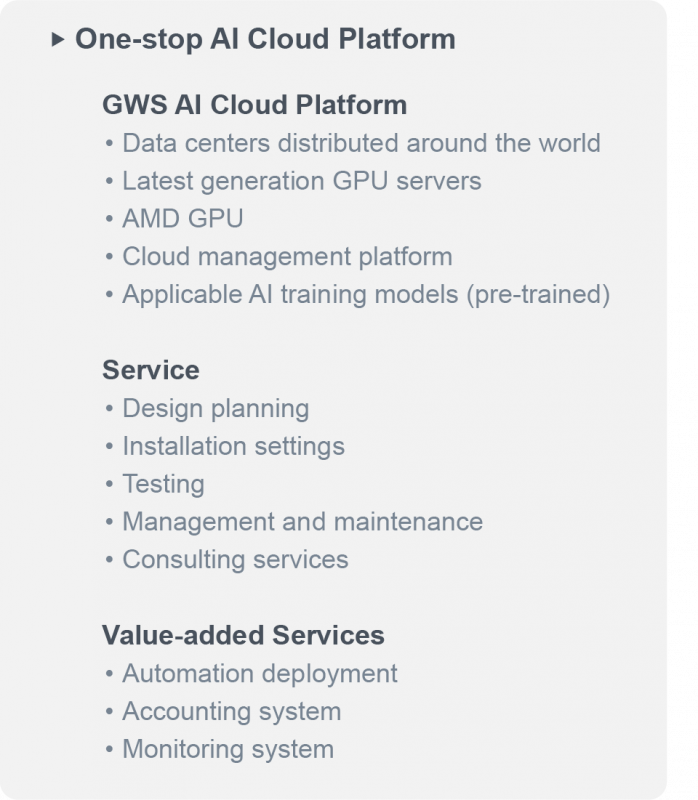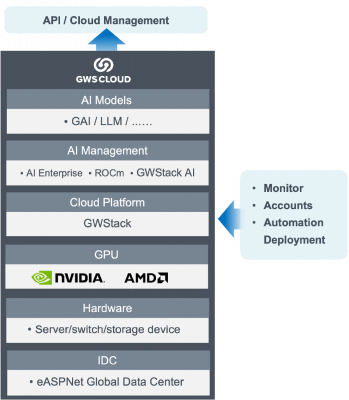
The explosive growth of AI technology has led both startups and traditional industries to join the race to develop or adopt AI solutions, all in the hopes of enhancing their future competitiveness. How can businesses select the right AI solution? Where should they start? Is there a one-stop AI solution available? We will guide you step-by-step from the ground up.
Key Highlights:
- What Problems or Pain Points Can AI Solve for Enterprises?
- Case Studies of AI Applications
- 5 Key Factors to Build an Enterprise AI Solution
- How to Evaluate AI Solution Costs and Pricing
- Barriers and Common Pain Points for Enterprises Adopting AI Solutions
- GWS AI Cloud: Three Plans for One-Stop AI Services
- Practical Experience Sharing on AI Solutions
What Problems or Pain Points Can AI Solve for Enterprises?
Before adopting or developing AI solutions, it is recommended to first gain a basic understanding of AI technology. This will help plan the corresponding computer server specifications, networks, software, hardware, and storage devices. Below, we introduce five common types of AI, the AI solutions they enable, and the problems or pain points they can address for enterprises.
- Large Language Models (LLMs)
AI technology is capable of understanding and generating natural language, with contextual processing and text creation capabilities, suitable for multilingual applications.
AI Solutions:
- Automated Chatbots/Customer Service: Provide 24/7 automated support, significantly reducing the burden on human customer service while improving response efficiency.
- Content Generation: Quickly create product descriptions, marketing materials, or reports, enhancing productivity.
- Intelligent Search Engines: Efficiently extract useful information from internal documents or databases, simplifying internal information retrieval.
Applicable Industries: Banking, e-commerce, marketing departments, etc.
- Generative AI
Generates images, text, music, and other content through algorithms, meeting personalized creative needs quickly. Ideal for creative and customized applications.
AI Solutions:
- Creative Ideation: Enhance design and creation efficiency in packaging design, event content, video production, and more.
- Content Customization: Generate tailored marketing materials based on customer requirements.
Applicable Industries: Entertainment, advertising design, education, digital media, etc.
- Federated Learning
A distributed machine learning approach that integrates and models data across multiple devices or organizations while ensuring data privacy.
AI Solutions:
- Personalized Recommendation Systems: Collaborate across e-commerce platforms or service providers to share user behavior data for personalized recommendations, avoiding data centralization. Examples include Netflix and Spotify providing precise recommendations based on user preferences.
- Traffic Flow Optimization: Share traffic data between city management systems to predict congestion and optimize vehicle dispatch.
- Cross-Organization Threat Detection: Establish global fraud alert systems to track suspicious transaction patterns and generate warnings.
Applicable Industries: E-commerce, healthcare, finance, transportation, education, telecommunications, etc.
- Edge AI
Deploys models on local devices for execution, reducing dependency on the cloud. Suitable for scenarios requiring real-time responses.
AI Solutions:
- Unstaffed Retail Stores: Retail stores equipped with AI cameras, sensors, and weight detection systems for automated/self-checkout, saving time and addressing labor shortages.
- Smart Edge Devices: Includes wake-up devices in headphones, smartwatches, and home appliances, as well as facial and voice recognition, in-car voice assistants, and autonomous driving systems, reducing manual operations.
- Industrial Automation: Incorporates robotic arms and production tools capable of analyzing equipment performance to conduct preventive maintenance, avoid emergencies, enhance safety, and increase operational efficiency.
Applicable Industries: Retail, smart home, manufacturing, logistics, etc.
- Reinforcement Learning
Learns optimal AI strategies through repeated trials, particularly suitable for dynamic and complex environments.
AI Solutions:
- Autonomous Driving: Trains models using simulation environments and deploys them into real vehicles.
- Game AI: Trains NPCs (non-player characters) to either challenge or assist human players in games.
- Traffic Management: Analyzes traffic flow during different times of the day to automatically adjust and optimize traffic light timing, improving efficiency and reducing congestion.
Applicable Industries: Transportation, logistics, gaming, etc.
Case Studies of AI Applications

- AI-Powered Unstaffed Convenience Stores in South Korea (Click to view news)Following the end of the COVID-19 pandemic, South Korea’s convenience store sales increased by 8.1%, yet labor shortages persist. Over the past two years, “Unstaffed Smart Store Services” have become increasingly popular in South Korea, Japan, Taiwan, and other countries.
- AI Showdown in Board Games (Click to view news)A classic AI application from 2017, the famous human vs. machine Go match from 8 years ago forever changed the world of Go. In 2016, a computer program named AlphaGo defeated the world’s top Go players. In 2017, AlphaZero, which used reinforcement learning AI technology, surpassed AlphaGo.
- Taiwan’s Most Gentle AI Smart Technology (Click to view news)Using the AI Black-faced Spoonbill Monitoring System and AIoT technology, AI contributes to ecological conservation efforts, achieving a win-win for ecology and the green economy.
- US Federal AI Recovers $1 Billion in Fraud Funds (Click to view news)By relying on machine learning for fraud detection, $1 billion was recovered in 2024 alone—a three-fold increase compared to the previous year.
5 Key Factors to Build an Enterprise AI Solution
Whether you are building your AI solution or adopting an existing one from the market, the following five key factors and decision-making directions can serve as a guide:
1. Clear Objectives
- Identify the goals of the AI solution and the required AI technology. For instance, to improve logistics efficiency, consider AI technologies for route optimization.
- Determine whether a customized AI solution is needed. Should you build it in-house or use existing tools and platforms?
2. Infrastructure and Data
- Plan the necessary infrastructure for AI applications, such as storage devices, computing power, GPU servers, or cloud computing resources (e.g. GWS AI Cloud, AWS, Google Cloud, Azure).
- Organize data sources (e.g. CRM systems, transaction records) and ensure you have sufficient high-quality data to train AI models. Assess whether the data needs further cleaning or structuring.
3. Build a Team
- Assess if you have qualified AI talent within your organization.
- Determine whether you need to collaborate with AI technology providers.
4. Pilot Testing and Validation
- Establish clear KPIs for success (e.g. improve efficiency by 10%, reduce costs by 15%).
- Start with small-scale pilot projects to validate the effectiveness of AI and minimize risks.
5. Cybersecurity and Compliance
- Ensure data complies with regulations such as GDPR (General Data Protection Regulation) and data security/privacy laws.
- Check if the AI application involves sensitive data (e.g. personal information, financial data) and implement appropriate data management and sensitive information protection measures.
How to Evaluate the Costs and Pricing of AI Solutions

In general, AI solution costs can be assessed from four key areas:
- Hardware: Includes servers equipped with GPUs (Graphics Processing Units) and CPUs (Central Processing Units), RAM (memory), SSDs/HDDs for storage, cooling systems, and network infrastructure.
- Software: Operating systems like Linux or Windows, AI frameworks/models, data processing and analytics libraries, development environments and tools, cloud platforms, and APIs.
- Data Center: Encompasses racks, power supply, networking, air conditioning, and other environmental control systems.
- Manpower: Involves AI-related technical engineers, data scientists/analysts, cloud architects, and system engineers.
The cost of AI solutions varies depending on the scale of the AI technology that the enterprise intends to adopt or develop. This is mainly influenced by differences in hardware specifications, which in turn affect storage devices, network infrastructure, and power configurations.
For budget allocation percentages, a common breakdown is:
- 30%–70% for hardware and data center
- 10%–60% for software
- 10%–20% for manpower
Smaller-scale AI solutions may require as little as NT$1 million (approx. US$30,000). However, for enterprises with massive datasets that demand ultra-fast and stable AI processing efficiency, significant investments in server GPUs/CPUs and data center infrastructure may require tens to hundreds of millions of NT dollars.
Barriers and Common Pain Points in Adopting AI Solutions
- High Costs for Building In-House AI SystemsBuilding an AI computing system in-house is prohibitively expensive. Many enterprises opt to use public cloud services to run AI models, but public cloud AI services can be costly and offer limited resources, leading to long wait times.
- Global Shortages and Regulatory HurdlesThe rapid development of AI computing power and increasingly stringent global regulatory frameworks have significantly increased the costs and barriers to AI adoption. In some cases, even with ample funds, it can be difficult to acquire scarce resources like GPU servers.
- Stringent Infrastructure Requirements for GPU ServersGPU servers have more demanding infrastructure requirements compared to traditional servers. These include cooling systems, power supply, cooling facilities, floor load-bearing capacity, and network transmission, all of which differ from conventional server setups.
GWS AI Cloud: Three Plans for Comprehensive AI Services
eASPNet’s GWS AI Cloud offers an end-to-end AI service, from AI infrastructure design, and hardware and software procurement, to server and appliance setup, and AI data center deployment and management. Leveraging NVIDIA and AMD GPU servers, it meets the high-performance needs of large language models (LLM) and machine learning (ML) training. The platform features a simplified graphical user interface, eliminating the need for traditional command-line operations commonly associated with AI/ML training tools, and includes multiple built-in training and inference environments.
Currently, Plan A: Compute Power Leasing is the most popular among enterprises. Unlike market-standard leasing plans that rent GPUs/CPUs as whole units, GWS AI Cloud offers flexible leasing options starting at 0.25 GPUs, 0.5 GPUs, and up to 1 or more GPUs. Pricing varies based on GPU allocation, ranging from US$2.7–11 (approx. US$3–12) per hour. For instance, leasing 0.5 GPUs for six months allows businesses to scale up compute power during the period if needed.
For companies aiming to deploy AI equipment internally or build their own AI cloud platform/data center, Plans B & C help reduce barriers to AI adoption.
Plan A: GWS AI Cloud Leasing
- Virtual GPU Subscription
- Cost Management and Monitoring
- Container Environment Hosting Services
- Comprehensive Cloud Solutions
Suitable for: Enterprises requiring an AI computing platform and infrastructure.
Plan B: GWStack AI Deployment
- AI Infrastructure Design
- Hardware Resources (CPU, RAM, Storage, NVIDIA & AMD GPUs)
- Installation, Configuration, and Testing Services
- Appliance Licensing and Technical Support
Suitable for: Enterprises needing hardware infrastructure for on-premises deployment or private AI cloud platforms.
Plan C: AI Cloud Platform Development
- Data Center Site Inspection, Planning, and Construction
- AI Infrastructure Design
- Installation, Configuration, and Testing Services
- Service Maintenance and Technical Support
Suitable for: Enterprises building large-scale AI application services, AI data centers, and foundational hardware/software infrastructures, especially those seeking to provide white-label AI cloud services.


Practical Experience with AI Solutions
Recently, eASPNet’s GWS AI Cloud has supported Taiwan’s Administration for Digital Industries (MODA), Dynamic Computing Technology, and businesses in Thailand to create customized GPU AI computing platforms. These platforms provide enterprises with sufficient, efficient, and stable computing power to run AI applications while meeting multiple cybersecurity requirements, including zero-trust architecture, defense against DDoS attacks, and multi-factor authentication.
- Learn More: GWS AI Cloud
- Customer Service Contacts: Live Chat Support





